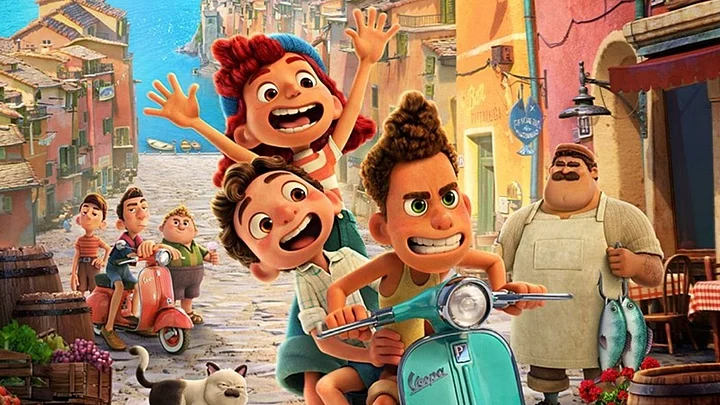There are two Pixars really. There’s the creative brain trust who have perfected crossover animated cinema with films like Ratatouille, Up, and WALL-E. Through sneakily tender moments, each of these films have allowed children and adults alike come to terms with our Emotions™. Then, there’s the corporate brass who thought Cars needed two sequels. Thank Santa Mozzarella, the animation studio’s new film Luca has been lovingly crafted by the former.
If you’re feeling down in the dumps what with the pandemic and the rains, just say “Silenzio, Bruno” and watch Luca. Pixar reels you in with another delightful bait of a movie, and you can’t help but fall for it hook, line and sinker. Sure to warm the heart of even the coldest fish is Luca’s tale of a summer bromance on the Italian seaside.
Luca (voiced by Jacob Tremblay) and Alberto (Jack Dylan Grazer) are two young sea monsters curious about the world above water. So, they assume human form and visit the town of Porto Rosso, where they spend the summer cycling, fishing and eating pasta with their misfit human friend Giulia (Emma Berman). But they must do all this while keeping their identities secret from the humans keen on hunting them.
A local triathlon competition becomes a means to what they think is their ultimate end: riding the Vespa. The iconic Italian scooter becomes a metaphor for freedom. For Luca, it is freedom from his parents intent on sending him to live with his uncle in the deep sea.
For Alberto, freedom is rooted in his friendship to Luca, who has become his only family, after having been abandoned by his dad before the story begins. For Giulia, freedom means an end to the tyranny of the local bully Ercole. The Room breakout star Tremblay captures Luca’s emotional evolution from cautious to courageous. Grazer and Berman bring a certain excitability of their own. Together, they make for a charming trio.
Vespa is also effective product placement, a nostalgic marker of the period the film is set in: the 1950s. Porto Rosso is a small town full of pastel-coloured houses perched on a hill surrounded by the azure sea. Posters of Roman Holiday adorn its walls.
Pasta, everyone’s favourite carbohydrate, makes appearances in every tempting form. There’s a sneaky cat named Machiavelli, whose each grumble will surely split your gills. The townsfolk say endearing things like “stupido” and “Santa Gorgonzola” no right-minded Italians would.
The storybook world of Luca is designed to look and feel like the director Enrico Casarosa’s own childhood. Pixar’s freewheeling creativity is on full display in the town of Porto Rosso, richly detailed down to the last pixel. Though Luca offers a portal into a whole new fantasy world, it still feels like a return to Pixar’s familiar universe. Fantasy isn’t mere escapism, but seamlessly blended with the real, making this animated realm all the more immersive.
These aren’t uncharted waters for Pixar. For the literal fish-out-of-water scenario of Luca isn’t far removed from Finding Nemo. Luca’s parents (Maya Rudolph and Jim Gaffigan) are an overanxious bunch much like Nemo’s dad. They want their son to keep his head above the water — in this case, below — before ultimately learning the importance of letting children live their own lives.
Stylistically, Luca is a different kettle of fish however. Starting with the sea, the film doesn’t explore the world underwater as expansively as Finding Nemo did. The movement of water and its interplay with light isn’t as lyrical as it was in Disney’s Moana.
But Pixar’s alchemy can be seen in the transformation from sea monster to human: the fins retract to make way for limbs, fingers and toes; the nose pokes out; and the blue hair turns brown. Getting wet on dry land can revert the sea monster to its original form. So, rain and any accidental contact with water presents a danger of being found out. This really sets the tone for the summer adventures to come.
Pixar, as always, remains committed to the medium as well as the Message. For humans, Luca and Alberto are “sea monsters.” Conversely, for the creatures living underwater, humans are “land monsters.” The film thus asks us all to recognise our shared humanity in these divisive times. The worlds above water and under collide for the characters to understand and accept themselves and one another better.
There is an infectious innocence to Luca’s story that also evokes the films of Hayao Miyazaki. The plot bears some similarities to Ponyo, where a goldfish sneaks away from her underwater home to a small fishing town, and befriends a human kid. The 2008 film from Studio Ghibli was essentially a “green” take on The Little Mermaid, on how overfishing and pollution have threatened the equilibrium of the marine ecosystems. Luca doesn’t share the same environmentalist ethos. Going green here, if anything, means sticking exclusively to pesto.
Pixar’s new film offers a breath of fresh air in this animation era where most films are indistinguishable from each other. That Luca is another feather in Pixar’s cap while not being one of its crowns isn’t downplaying its allure or artistry, but simply accounting the incredibly high bar some of the studio’s previous masterworks have set.
Luca releases in India on Disney+ Hotstar Premium on 18 June.
Rating: 4 Quints out of 5.
(At The Quint, we question everything. Play an active role in shaping our journalism by becoming a member today.)
